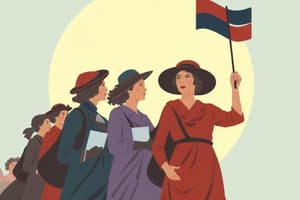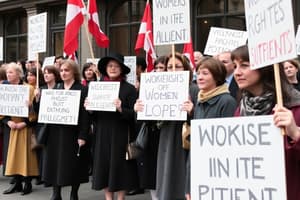Podcast
Questions and Answers
Why did the suffragettes lose many supporters during their campaign?
Why did the suffragettes lose many supporters during their campaign?
The increase in violence meant that the suffragettes lost many supporters who did not want to be associated with destructive and dangerous tactics.
What was Prime Minister Asquith's stance on giving votes to women?
What was Prime Minister Asquith's stance on giving votes to women?
Prime Minister Asquith was personally against votes for women.
What opportunities did women get during the First World War?
What opportunities did women get during the First World War?
They got the chance to fill in for men and do jobs they had never done before, such as bus drivers, police officers, mechanics, road menders, munitions factory workers, nurses, and ambulance drivers.
Who was the first woman elected as a British MP in 1918?
Who was the first woman elected as a British MP in 1918?
What was the significance of the work done by women during the war?
What was the significance of the work done by women during the war?
Describe all the changes that parliament made the voting laws in 1918
Describe all the changes that parliament made the voting laws in 1918
When did women finally achieve the same voting rights as men?
When did women finally achieve the same voting rights as men?
Flashcards are hidden until you start studying
Study Notes
Suffragette Support Decline
- Suffragettes lost supporters due to their militant tactics, which alienated moderate voters.
- The public's perception shifted with increased political violence and property damage caused by some suffragette actions.
- The First World War diverted attention and resources away from women's suffrage, as national unity became a priority.
Prime Minister Asquith's Stance
- Prime Minister H.H. Asquith opposed granting women the right to vote, believing it could disrupt social order.
- His government resisted suffrage movements, leading to frustration among suffragettes and their supporters.
Women's Opportunities During WWI
- Women entered traditionally male roles, taking jobs in factories, transportation, and agriculture due to labor shortages.
- Increased participation in the workforce led to greater social independence and awareness of women's capabilities.
- Working in wartime industries resulted in economic empowerment, improving their status in society.
First Female MP
- Constance Markievicz became the first woman elected as a British MP in 1918.
- Although elected, she did not take her seat in Parliament, as she was a member of Sinn Féin, which refused to recognize the British Parliament.
Significance of Women's War Work
- Women's contributions during WWI were critical in maintaining the economy and supporting the war effort.
- The range of roles filled by women shifted societal attitudes towards their capabilities, laying groundwork for future rights.
- Recognized contributions led to a stronger argument for women's suffrage post-war.
Changes to Voting Laws in 1918
- The Representation of the People Act 1918 expanded voting rights to women aged 30 and over who met certain property qualifications.
- Men's voting age was lowered to 18, while the age for women remained at 30.
- Approximately 8.4 million women gained the right to vote in the UK.
Achievement of Equal Voting Rights
- Equal voting rights for women and men were achieved in 1928 with the Representation of the People (Equal Franchise) Act.
- This law extended the franchise to all women aged 21 and over, aligning their voting rights with those of men.
Studying That Suits You
Use AI to generate personalized quizzes and flashcards to suit your learning preferences.




